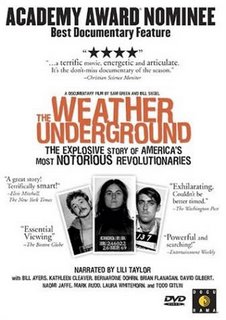Saturday, February 25, 2006
The Weather Underground and Activism Today
 I went out to a screening of the documentary The Weather Underground tonight at the Media Education Foundation (MEF) in Northampton, Mass. I had seen the film when it came out on DVD but I wondered what the experience of watching it in a group would be like so I went to see it again.
I went out to a screening of the documentary The Weather Underground tonight at the Media Education Foundation (MEF) in Northampton, Mass. I had seen the film when it came out on DVD but I wondered what the experience of watching it in a group would be like so I went to see it again.I noticed a certain amount of uncomfortable laughter for the first five or ten minutes. The phrases and attitudes of the late 1960s counterculture sound very dated and quaint now, relics of another era. The laughter mostly disappeared as the film progressed. Whatever you might think of the Weather Underground (WU), there is no denying the power of people who are willing to put their lives on the line for their beliefs. I'm put in mind of the closing of the U.S. Declaration of Independence: "...we mutually pledge to each other our lives, our Fortunes, & our sacred Honor."
I know it was a different mileau yet I'm left wondering where to find such American radicals are today. Yes, I know people are being arrested at demonstrations and are doing hard work organizing events but it doesn't seem to me to be at the same level as the WU. Not that I'm advocating blowing shit up, which would be a rather foolish thing to do in a public forum like this blog, but I still wonder about where to find the modern parallel to such commitment to a cause.
After the screening, Carl Oglesby spoke at some length about his experiences and discussions with some of the Weatherpeople at the time. Mr. Oglesby was president of Students for a Democratic Society (SDS) around the time the "Weather Kids" (his phrase) took over SDS. He was quite adamant about not idolizing the WU. In his opinion, they turned down a path of actions which were very wrong.
Mr. Oglesby also preferred a different documentary about the SDS in that general time period, Rebels with a Cause. Unsurprisingly, he was one of the interviewees in this film.
While the Port Huron Statement of the Students for a Democratic Society, 1962 may seem naive today, for the time it was bold analysis and important. Let me end this post with a bit from it.
Some would have us believe that Americans feel contentment amidst prosperity -- but might it not better be called a glaze above deeplyfelt anxieties about their role in the new world? And if these anxieties produce a developed indifference to human affairs, do they not as well produce a yearning to believe there is an alternative to the present, that something can be done to change circumstances in the school, the workplaces, the bureaucracies, the government? It is to this latter yearning, at once the spark and engine of change, that we direct our present appeal. The search for truly democratic alternatives to the present, and a commitment to social experimentation with them, is a worthy and fulfilling human enterprise, one which moves us and, we hope, others today. On such a basis do we offer this document of our convictions and analysis: as an effort in understanding and changing the conditions of humanity in the late twentieth century, an effort rooted in the ancient, still unfulfilled conception of man attaining determining influence over his circumstances of life.
Values
Making values explicit -- an initial task in establishing alternatives -
- is an activity that has been devalued and corrupted. The conventional moral terms of the age, the politician moralities -- "free world", "people's democracies" -- reflect realities poorly, if at all, and seem to function more as ruling myths than as descriptive principles. But neither has our experience in the universities brought as moral enlightenment. Our professors and administrators sacrifice controversy to public relations; their curriculums change more slowly than the living events of the world; their skills and silence are purchased by investors in the arms race; passion is called unscholastic. The questions we might want raised -- what is really important? can we live in a different and better way? if we wanted to change society, how would we do it? -- are not thought to be questions of a "fruitful, empirical nature", and thus are brushed aside.
 The CR FAQ - An Introduction to Celtic Reconstructionist Paganism
The CR FAQ - An Introduction to Celtic Reconstructionist Paganism





